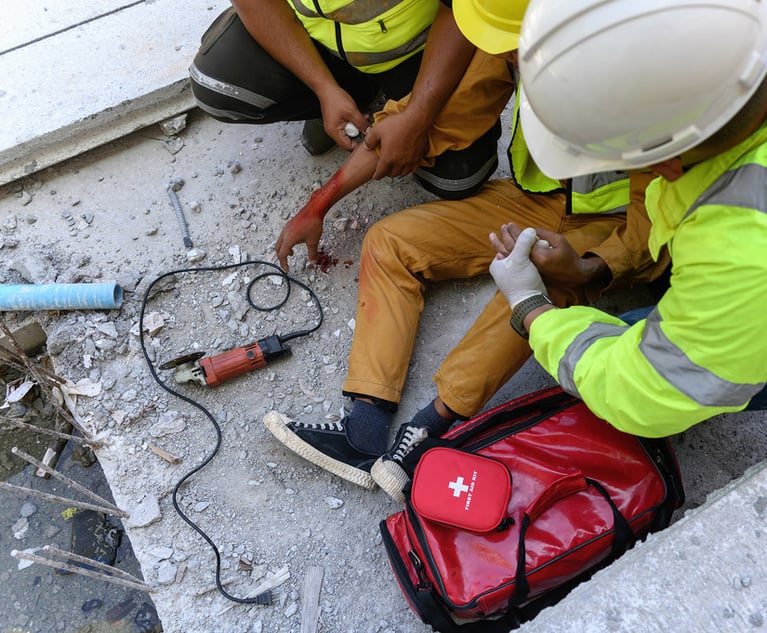The Importance of Construction Project Management
Effective construction project management benefits owners by increasing the potential for successful project completion—on time, within budget, and free of financial or legal complications.
March 14, 2019 at 08:00 AM
7 minute read
 Kzenon – Fotolia
Kzenon – Fotolia
Effective construction project management benefits owners by increasing the potential for successful project completion—on time, within budget, and free of financial or legal complications. Construction management is a professional service that uses specialized project management techniques to oversee the planning, design and construction of a project. While project oversight services evolve over the course of the project, construction management is intended to optimize best industry practices, prudent management decision-making, and effective and transparent project controls and reporting methods.
Construction management is particularly vital to large-scale projects that have more potential for problems that could significantly delay the project and cost money. A construction manager measures each design decision with careful analysis that calculates the impact that decision will make on the budget and schedule. Without a professional construction management team, an unforeseen problem risks derailing the entire project. When a project includes a construction manager early in the process, the construction manager is not only able to better plan for potential problems, but the project also benefits from the construction manager's ability to find money and time-saving opportunities.
Project management can also provide clear lines of accountability. With a construction management team in place, there is little confusion about who is the decision maker or what the project objectives are. The construction manager directs the focus of the overall project team so that all understand what they are supposed to be doing and why. The construction manager's global view of the project enables agile management of evolving risks as they occur.
Planning and Organizing
The first step in project management is the planning and organizing stage. The project management function involves creation of plans, processes, budgets, and the allocation of resources. The construction management function continues, as the project commences, as the first line of quality control over the execution of the work. A quality construction manager is often, but not always, an architect or engineer, but always has a lot of construction knowledge and experience. Project managers will consider the successes and failures of past projects in making certain that the current project does not replicate the bad, and benefits from the good.
Pre-construction construction management services include the choice of construction project delivery system, and bidding and retention of contractors. An effective construction manager will review the contracts to ensure there is no duplication among designer, contractor and owner obligations, and perform a constructability review as well as a schedule review to ascertain appropriate and realistic time frames for the project.
Construction Phase
During the construction phase, it is important for the construction management team to stay closely involved in the project so that there are no surprises. The construction management team will monitor the progress and quality of the construction. By keeping tabs on the submittal process, the construction manager may anticipate and avoid delays by guiding the contractor in timely ordering, fabrication of long lead-time items, and ensuring proper sequencing of the trades. Attendance of the construction manager at job meetings and regular reporting are valuable tools for keeping a project on track and avoiding disputes.
Indeed, troubleshooting is one of the main charges of the project oversight team. If the project oversight team becomes aware that the project is not adhering to the schedule or budget planned by the project management team, the oversight team can make adjustments and improvements to assist in keeping the project on track.
Construction managers also provide centralized communication between contractors, owners and designers. Having an objective third-party in place that speaks the language of all of the project participants can result in fewer change orders and early conflict avoidance. Improved communication can result in better integration among the parties, and the promotion of useful give and take.
Post-Construction
A construction manager's role does not end with the completion of the work. Rather, support in the form of dispute resolution, contract close-out, obtaining and reviewing operation and maintenance manuals, supervising punch list and warranty work, and interfacing with government authorities to obtain temporary certificates of occupancy and certificates of occupancy, provide major benefits to the owner at the crucial tail end of the project.
In the event a project issue evolves into a dispute, owners and their counsel heavily depend on the construction management team for aid in the claims process. The construction manager is the repository of important factual and technical information about the project and the progress of the work. As the owner's eyes and ears, the construction manager is well-positioned to support or defend against a contractor's claim. Communications between owner's counsel and the construction management team (as owner's agent) is privileged, thus permitting owner's counsel to utilize the construction manager's wealth of knowledge in developing legal strategy.
Benefits of Construction Project Management
Some owners attempt to avoid overhead costs by scrimping on construction management costs, not realizing that it may cost them more in the long run. By having an effective project management team in place, conflicts and claims may be avoided at significant cost saving to the owner. For example, if a skilled construction manager is watching the construction closely, a bad concrete pour, or an improper steel connection can be detected early, right when it occurs, instead of well into the construction stage. If such an issue is not detected until well after it occurs, performing the remedial work can cause expensive and time-consuming delays to the entire project. By having the construction management team regularly review construction activities, the owner improves the chances of uncovering conflicts, reducing unexpected change orders, detecting potential design errors, revealing poor construction practices and avoiding claims.
Another way the construction management team may be able to protect the owner from delays, conflicts and cost overruns is by conducting periodic project audits. The larger, more sophisticated construction management firms employ estimators, accountants and cost control specialists. These additional functions can benefit projects in a variety of ways. One way that an audit can help a project is that it can help detect fraud. This can include contractor overbilling, inappropriate cost-shifting, abusive change-order practices and other abnormalities. Audits can also verify contractor compliance with government requirements (i.e., prevailing wage, disadvantaged business enterprise). Violation of these requirements can slow down or even stop a project mid-stream. Lastly, an audit can help keep a project within budget by allocating responsibility for unexpected costs to the proper party.
Regular reporting by the construction management team is another tool used to ensure that a project is proceeding according to plan and stays on track. While the volume of documentation created by the construction management team may seem extreme, careful adherence to regular tracking makes it easy to see when something goes off course. The earlier a deviation from the schedule is detected, the easier and less costly it is to adjust and correct the problem.
Some construction management firms also heavily rely on the latest digital technology. Digital technologies—from building information modeling (BIM) to the use of drones and artificial intelligence—are transforming every phase of capital projects from selection, planning, finance, delivery, maintenance, portfolio management and beyond. Digital technology—with its ability to capture, transmit and analyze mass data—is becoming a critical component for successful project oversight and delivery. Choosing a construction management firm with a high level of technological expertise can benefit the project in the long run.
Finally, improvements in overall construction project communication, efficiency and cost provided by effective construction management are clear. Project management makes sure the right people do the right things at the right times, the result: project success.
Jacqueline Greenberg Vogt is a shareholder in Greenberg Traurig's Construction Law Practice. Vogt practices in the firm's Florham Park, New Jersey, and New York City offices.
This content has been archived. It is available through our partners, LexisNexis® and Bloomberg Law.
To view this content, please continue to their sites.
Not a Lexis Subscriber?
Subscribe Now
Not a Bloomberg Law Subscriber?
Subscribe Now
NOT FOR REPRINT
© 2025 ALM Global, LLC, All Rights Reserved. Request academic re-use from www.copyright.com. All other uses, submit a request to [email protected]. For more information visit Asset & Logo Licensing.
You Might Like
View All

Dispute Resolution Boards—Getting Real Time Decisions on Construction Projects
7 minute read
Insurer Has No Duty to Defend 'Laidlow' Claims, NJ Supreme Court Says
3 minute read
Construction Worker Hit by Falling Concrete Settles Claims for $2.3M
4 minute readTrending Stories
- 1Reviewing Judge Merchan's Unconditional Discharge
- 2With New Civil Jury Selection Rule, Litigants Should Carefully Weigh Waiver Risks
- 3Young Lawyers Become Old(er) Lawyers
- 4Caught In the In Between: A Legal Roadmap for the Sandwich Generation
- 5Top 10 Developments, Lessons, and Reminders of 2024
Who Got The Work
J. Brugh Lower of Gibbons has entered an appearance for industrial equipment supplier Devco Corporation in a pending trademark infringement lawsuit. The suit, accusing the defendant of selling knock-off Graco products, was filed Dec. 18 in New Jersey District Court by Rivkin Radler on behalf of Graco Inc. and Graco Minnesota. The case, assigned to U.S. District Judge Zahid N. Quraishi, is 3:24-cv-11294, Graco Inc. et al v. Devco Corporation.
Who Got The Work
Rebecca Maller-Stein and Kent A. Yalowitz of Arnold & Porter Kaye Scholer have entered their appearances for Hanaco Venture Capital and its executives, Lior Prosor and David Frankel, in a pending securities lawsuit. The action, filed on Dec. 24 in New York Southern District Court by Zell, Aron & Co. on behalf of Goldeneye Advisors, accuses the defendants of negligently and fraudulently managing the plaintiff's $1 million investment. The case, assigned to U.S. District Judge Vernon S. Broderick, is 1:24-cv-09918, Goldeneye Advisors, LLC v. Hanaco Venture Capital, Ltd. et al.
Who Got The Work
Attorneys from A&O Shearman has stepped in as defense counsel for Toronto-Dominion Bank and other defendants in a pending securities class action. The suit, filed Dec. 11 in New York Southern District Court by Bleichmar Fonti & Auld, accuses the defendants of concealing the bank's 'pervasive' deficiencies in regards to its compliance with the Bank Secrecy Act and the quality of its anti-money laundering controls. The case, assigned to U.S. District Judge Arun Subramanian, is 1:24-cv-09445, Gonzalez v. The Toronto-Dominion Bank et al.
Who Got The Work
Crown Castle International, a Pennsylvania company providing shared communications infrastructure, has turned to Luke D. Wolf of Gordon Rees Scully Mansukhani to fend off a pending breach-of-contract lawsuit. The court action, filed Nov. 25 in Michigan Eastern District Court by Hooper Hathaway PC on behalf of The Town Residences LLC, accuses Crown Castle of failing to transfer approximately $30,000 in utility payments from T-Mobile in breach of a roof-top lease and assignment agreement. The case, assigned to U.S. District Judge Susan K. Declercq, is 2:24-cv-13131, The Town Residences LLC v. T-Mobile US, Inc. et al.
Who Got The Work
Wilfred P. Coronato and Daniel M. Schwartz of McCarter & English have stepped in as defense counsel to Electrolux Home Products Inc. in a pending product liability lawsuit. The court action, filed Nov. 26 in New York Eastern District Court by Poulos Lopiccolo PC and Nagel Rice LLP on behalf of David Stern, alleges that the defendant's refrigerators’ drawers and shelving repeatedly break and fall apart within months after purchase. The case, assigned to U.S. District Judge Joan M. Azrack, is 2:24-cv-08204, Stern v. Electrolux Home Products, Inc.
Featured Firms
Law Offices of Gary Martin Hays & Associates, P.C.
(470) 294-1674
Law Offices of Mark E. Salomone
(857) 444-6468
Smith & Hassler
(713) 739-1250






